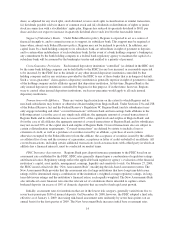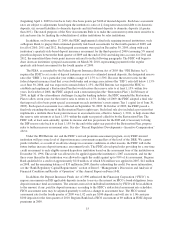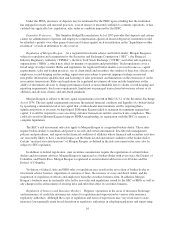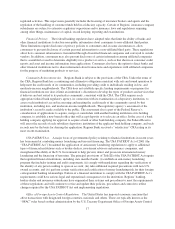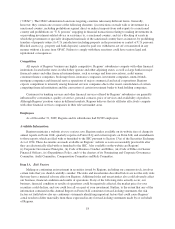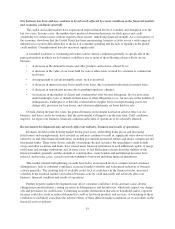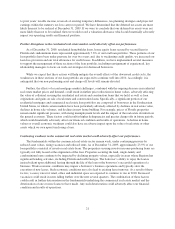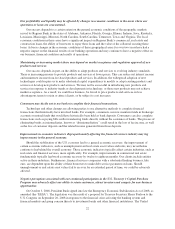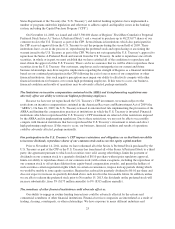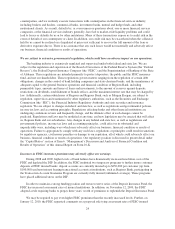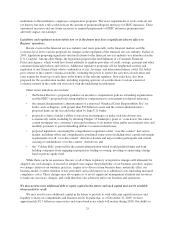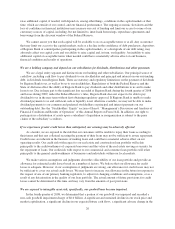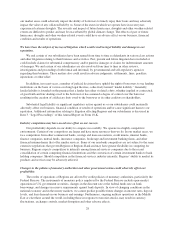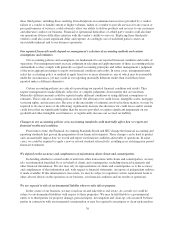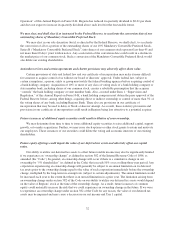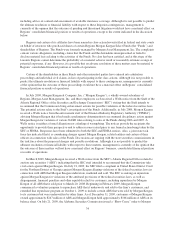Regions Bank 2009 Annual Report Download - page 38
Download and view the complete annual report
Please find page 38 of the 2009 Regions Bank annual report below. You can navigate through the pages in the report by either clicking on the pages listed below, or by using the keyword search tool below to find specific information within the annual report.counterparties, and we routinely execute transactions with counterparties in the financial services industry,
including brokers and dealers, commercial banks, investment banks, mutual and hedge funds, and other
institutional clients. As a result, defaults by, or even rumors or questions about, one or more financial services
companies, or the financial services industry generally, have led to market-wide liquidity problems and could
lead to losses or defaults by us or by other institutions. Many of these transactions expose us to credit risk in the
event of default of our counterparty or client. In addition, our credit risk may be exacerbated when the collateral
held by us cannot be realized or is liquidated at prices not sufficient to recover the full amount of the loan or
derivative exposure due us. There is no assurance that any such losses would not materially and adversely affect
our business, financial condition or results of operations.
We are subject to extensive governmental regulation, which could have an adverse impact on our operations.
The banking industry is extensively regulated and supervised under both federal and state law. We are
subject to the regulation and supervision of the Board of Governors of the Federal Reserve System (the “Federal
Reserve”), the Federal Deposit Insurance Company (the “FDIC”) and the Superintendent of Banking of the State
of Alabama. These regulations are intended primarily to protect depositors, the public and the FDIC insurance
fund, and not our shareholders. These regulations govern matters ranging from the regulation of certain debt
obligations, changes in the control of bank holding companies and state-chartered banks, and the maintenance of
adequate capital to the general business operations and financial condition of Regions Bank, including
permissible types, amounts and terms of loans and investments, to the amount of reserves against deposits,
restrictions on dividends, establishment of branch offices, and the maximum interest rate that may be charged by
law. Additionally, certain subsidiaries of Regions and Regions Bank, such as Morgan Keegan, are subject to
regulation, supervision and examination by other regulatory authorities, such as the Securities and Exchange
Commission (the “SEC”), the Financial Industry Regulatory Authority and state securities and insurance
regulators. We are subject to changes in federal and state law, as well as regulations and governmental policies,
income tax laws and accounting principles. Regulations affecting banks and other financial institutions are
undergoing continuous review and frequently change, and the ultimate effect of such changes cannot be
predicted. Regulations and laws may be modified at any time, and new legislation may be enacted that will affect
us, Regions Bank and our subsidiaries. Any changes in any federal and state law, as well as regulations and
governmental policies, income tax laws and accounting principles, could affect us in substantial and
unpredictable ways, including ways which may adversely affect our business, financial condition or results of
operations. Failure to appropriately comply with any such laws, regulations or principles could result in sanctions
by regulatory agencies, civil money penalties or damage to our reputation, all of which could adversely affect our
business, financial condition or results of operations. Our regulatory position is discussed in greater detail under
the “Capital Ratios” section of Item 6. “Management’s Discussion and Analysis of Financial Condition and
Results of Operation” of this Annual Report on Form 10-K.
Increases in FDIC insurance premiums may adversely affect our earnings.
During 2008 and 2009, higher levels of bank failures have dramatically increased resolution costs of the
FDIC and depleted the DIF. In addition, the FDIC instituted two temporary programs to further insure customer
deposits at FDIC insured banks: deposit accounts are currently insured up to $250,000 per customer (up from
$100,000) and non-interest bearing transactional accounts at institutions, such as Regions Bank, participating in
the Transaction Account Guarantee Program are currently fully insured (unlimited coverage). These programs
have placed additional stress on the DIF.
In order to maintain a strong funding position and restore reserve ratios of the Deposit Insurance Fund, the
FDIC has increased assessment rates of insured institutions. In addition, on November 12, 2009, the FDIC
adopted a rule requiring banks to prepay three years’ worth of premiums to replenish the Deposit Insurance Fund.
We may be required to pay even higher FDIC premiums than the recently increased levels. Further, on
January 12, 2010, the FDIC requested comments on a proposed rule tying assessment rates of FDIC-insured
24


